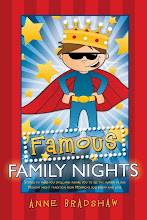Several years ago, I read the LDS novel "Emily" by Jack Weyland. Emily is a young woman who is severely burned when the sleeve of her shirt catches fire while she's cooking lunch at the stove. Her recovery is extremely painful and I remembered wincing every time she went in for therapy. That book has stayed in my mind so clearly that every time I stand at the stove, I think about it, and make sure there are no flammable materials close at hand. Weyland did a good thing, helping his readers remember to be careful cooks.
But he also did something else - he imprinted his name on my brain. I couldn't remember the title of the actual novel and had to look it up online, but I remembered who wrote it. I don't just think about how important it is to be careful while cooking - I remember how well he wrote Emily's recovery scenes and how I felt while reading them. Then I start to think about the other Weyland novels I've read over the years, and the ones I enjoyed vs. the ones I didn't enjoy quite so much. This train of thought doesn't take me very long - usually ten seconds or so - but it's completely automatic and it happens every time I use the stove. Weyland connected his character's mishap to a common, everyday occurrence like cooking at a stove, something we use every single day, and so every single day, we think about Jack Weyland. If his character had been burned in an airplane crash, we wouldn't think about the book as often, because really, how often do we fly? Whereas, we use the stove often.
I don't know if Weyland did that on purpose. Maybe he used the stove to cause the fire because he wanted to keep the story simple, and having his character make lunch is sure easier than getting her on a plane. Regardless of his reasoning, the stove was brilliant.
We want our readers to think about our books time after time. We don't want our work to get read and then shoved to the back of the bookcase, never to resurface - we want our readers to become so connected to the characters that they think about them long after the last page has been flipped. How can we do this? We can't all set our characters on fire - I think someone would notice that. But we can take simple, everyday happenings and give them a twist, whether dramatic or comedic, so that every time our readers experience that common event, they are reminded of our book, and perhaps want to read it again, and maybe, just maybe, go out to buy the next one we've written. And that is a very good thing.
Wednesday, July 15, 2009
Making a Memorable Book
Posted by Tristi Pinkston at 7:00 AM
Labels: Tristi, Writing Tips
Subscribe to:
Post Comments (Atom)

















4 comments:
Love the blog!
Thanks, Suzette!
There is wisdom in your blog, and I learned something valuable that will help me as a writer. Thank you
Connecting with your reader is important. I recently read a book that sounded so much like my life it was eerie. But some of the other reviews were not as bubbly as mine. One reviewer said she just couldn't get into the book and didn't know why. I do. She couldn't connect with the book because she hadn't had the types of experiences the author described. I'm being long winded but I'm trying to validate your point. We use the stove every day, so this is the kind of thing we'd remember. Also, if a person has ever been burned, they would associate that experience with this book. My husband was severely burned by radiator steam in his late teens, and to this day stories of burns make him cringe. Great blog, Tristi.
Post a Comment